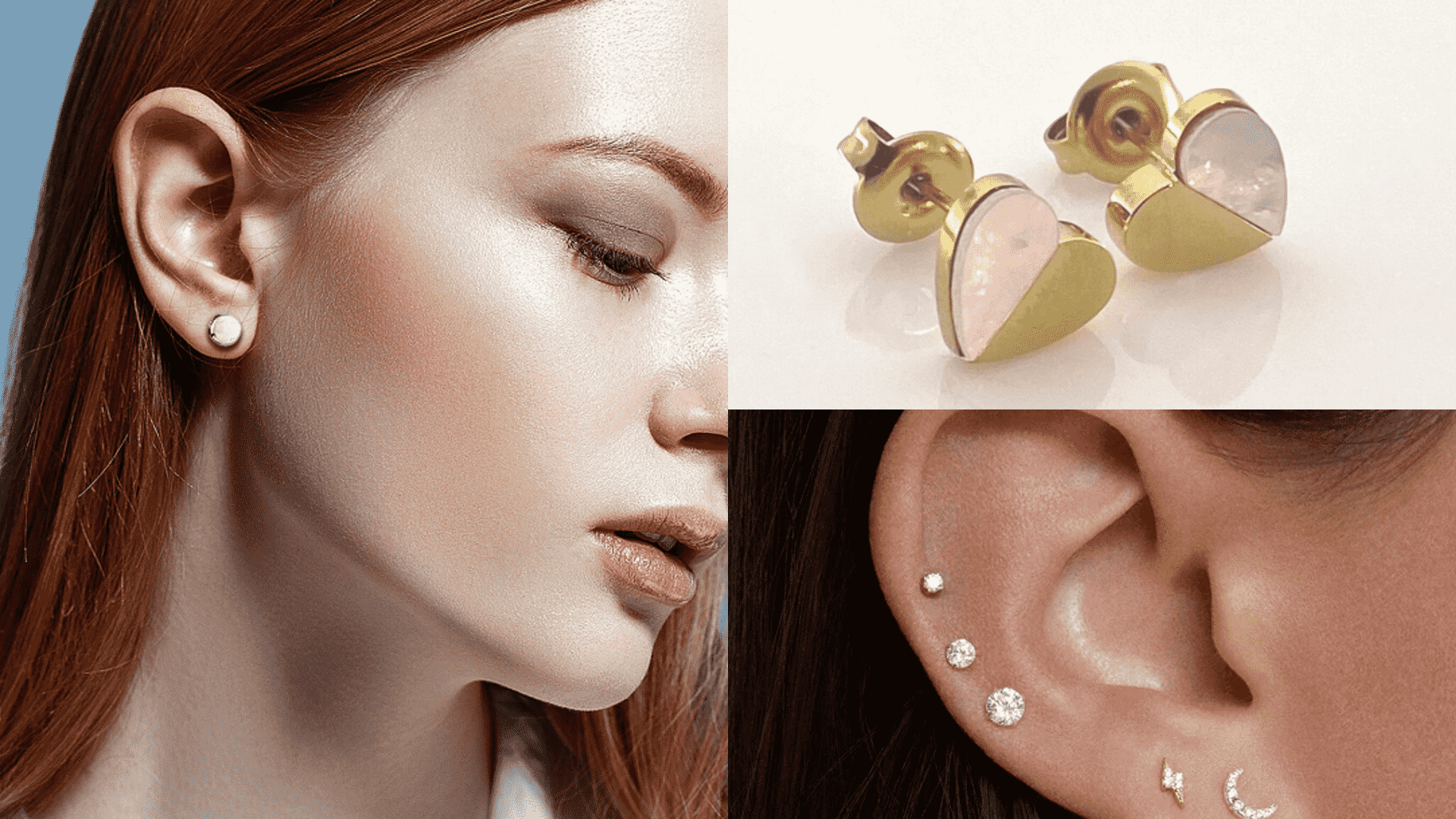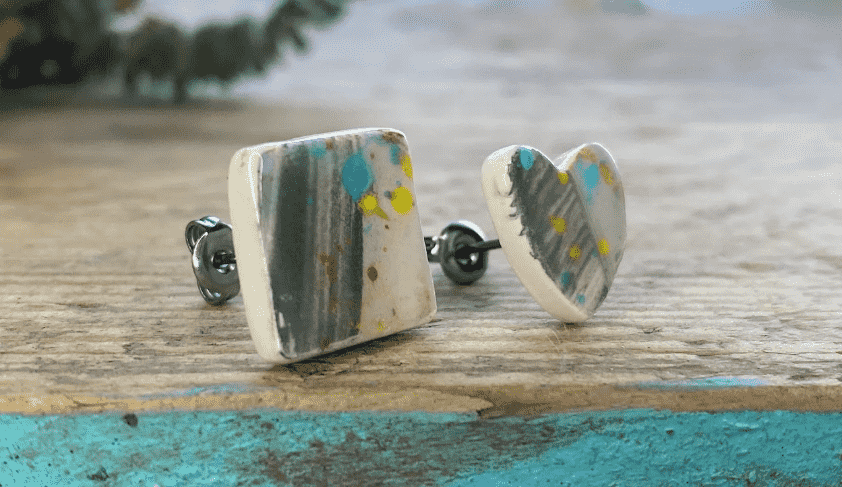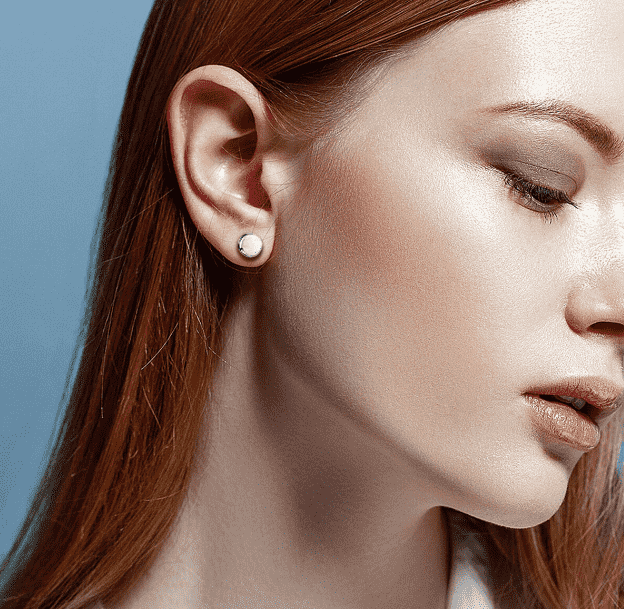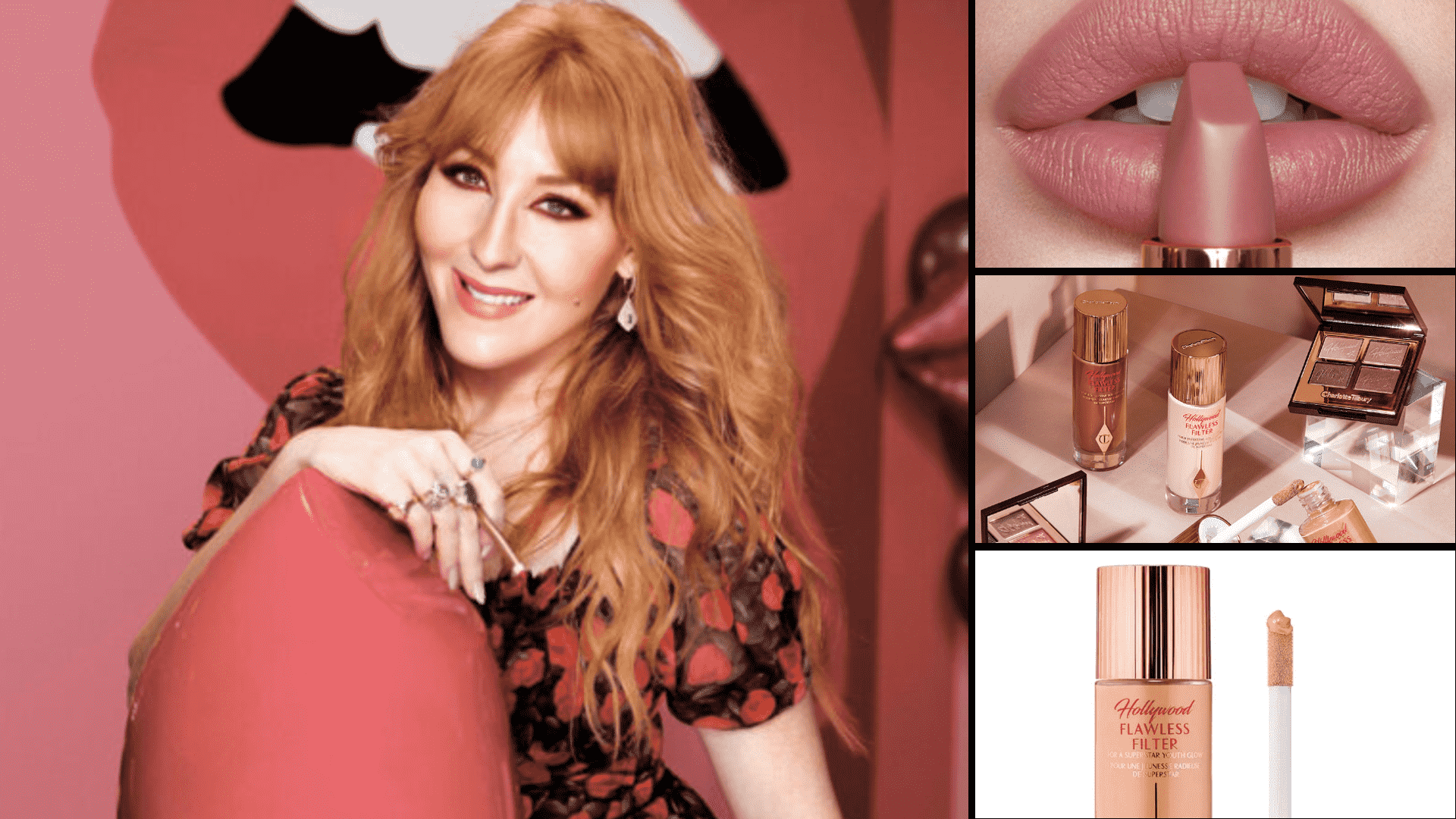Fashion
Hypoallergenic Stud Earrings: The Perfect Solution for Sensitive Ears

Hypoallergenic Stud Earrings: Wearing earrings can be a great way to elevate your style, but for those with sensitive skin, finding the right pair can be a challenge. If you’ve ever experienced itching, redness, or irritation from your earrings, it could be a sign that you’re allergic to certain metals. That’s where hypoallergenic stud earrings come to the rescue! In this article, we’ll delve deep into everything you need to know about these earrings and how they can provide a stylish and comfortable option for people with sensitive ears.
What Does Hypoallergenic Mean?
Before diving into the best materials and styles of hypoallergenic earrings, it’s important to understand what hypoallergenic truly means. The term hypoallergenic refers to materials that are less likely to cause an allergic reaction. While no material can be 100% hypoallergenic for everyone, earrings made from certain metals and materials greatly reduce the risk of allergic reactions, especially for those prone to metal allergies.

For more like that, Visit BusinessRadar
Common Causes of Metal Allergies
Most earring-related allergies are caused by nickel, a metal commonly used in cheaper jewelry. Nickel can be absorbed by the skin, leading to irritation and allergic reactions in sensitive individuals. The symptoms of a nickel allergy may include itching, swelling, redness, and even blistering in more severe cases. Unfortunately, nickel is often found in many everyday accessories, including earrings, which makes hypoallergenic options so crucial.
Why Choose Hypoallergenic Stud Earrings?
Stud earrings are a popular and versatile jewelry choice, perfect for both casual wear and formal occasions. However, if you’re prone to metal allergies, finding a pair that doesn’t irritate your skin can feel impossible. That’s where hypoallergenic stud earrings come into play. These earrings are made from materials specifically designed to prevent allergic reactions, making them ideal for anyone with sensitive ears.
Benefits of Hypoallergenic Stud Earrings
- Reduced Risk of Irritation: The primary benefit of hypoallergenic earrings is that they minimize the risk of irritation, redness, and discomfort caused by metal allergies.
- Variety of Styles: Hypoallergenic doesn’t mean boring! You can find hypoallergenic studs in a wide array of styles, from simple, minimalist designs to intricate, gemstone-adorned options.
- Safe for Prolonged Wear: Whether you wear your earrings all day or just for special occasions, hypoallergenic studs ensure your ears remain comfortable without sacrificing style.
Best Materials for Hypoallergenic Stud Earrings
Not all metals are created equal when it comes to sensitivity. If you’re looking for earrings that won’t irritate your ears, it’s important to choose the right materials. Below are some of the best options for hypoallergenic stud earrings.
1. Surgical-Grade Stainless Steel
One of the most commonly used materials in hypoallergenic jewelry is surgical-grade stainless steel. Known for its strength and durability, this metal is also non-reactive, making it ideal for sensitive skin. Because it’s used in medical implants, you can trust that it’s safe and hypoallergenic. This type of metal is also quite affordable, making it a popular choice for everyday wear.
2. Titanium
Titanium earrings are another excellent choice for anyone with sensitive ears. This lightweight, strong metal is known for its biocompatibility, meaning it’s highly unlikely to cause any allergic reactions. In fact, titanium is often used in surgical implants due to its hypoallergenic nature. Its lightweight property makes it comfortable to wear for long periods, and it’s available in a variety of polished finishes for added style.
3. Niobium
Though less well-known, niobium is an excellent option for hypoallergenic stud earrings. This metal is naturally hypoallergenic and comes in various colors when anodized. Niobium’s unique properties make it a fun, yet safe, choice for sensitive skin. Its resistance to corrosion and its ability to be anodized into vibrant colors make niobium a versatile and stylish option.
4. 14k or 18k Gold
For those looking for something more luxurious, 14k or 18k gold earrings are a great hypoallergenic choice, especially when they’re made from solid gold rather than plated varieties. It’s important to note that the higher the karat, the more pure the gold, meaning fewer other metals (like nickel) are mixed in. This reduces the likelihood of an allergic reaction. However, be cautious with gold-plated earrings, as the plating can wear off, exposing your skin to potential irritants.
5. Platinum
Platinum earrings are the ultimate luxury when it comes to hypoallergenic jewelry. This rare metal is naturally hypoallergenic and incredibly durable. Though platinum is more expensive than other materials, its superior quality, long-lasting nature, and hypoallergenic properties make it a worthy investment for sensitive ears.
How to Identify Hypoallergenic Earrings
Shopping for hypoallergenic earrings can be tricky if you’re not sure what to look for. Here are some tips to help you identify the best hypoallergenic stud earrings for your needs:
Look for Nickel-Free Labels
When shopping for hypoallergenic earrings, always look for labels or product descriptions that specify the earrings are nickel-free. Many jewelry brands now include this information to cater to those with metal allergies. If the label doesn’t mention nickel or hypoallergenic properties, it’s best to assume the earrings may contain nickel and avoid them.
Opt for Trusted Brands
Certain jewelry brands specialize in creating hypoallergenic earrings. When in doubt, opt for brands that are known for their commitment to sensitive skin, like Blomdahl, Studex, or Rowan. These companies specifically cater to people with metal allergies, so you can trust their earrings to be both stylish and comfortable.
Avoid Cheap Jewelry
While it can be tempting to buy cheap earrings, they often contain irritating metals like nickel or copper. Investing in high-quality hypoallergenic studs will save you from discomfort and potential skin reactions. Plus, hypoallergenic earrings tend to last longer, making them a better value over time.
Caring for Your Hypoallergenic Stud Earrings

Even though hypoallergenic earrings are designed to minimize irritation, proper care is still essential to keep your ears healthy and your jewelry looking its best.
Clean Your Earrings Regularly
Just like any other type of jewelry, hypoallergenic earrings should be cleaned regularly to prevent buildup of dirt, oils, or bacteria. Clean your earrings with a soft cloth and warm, soapy water, or use a specialized jewelry cleaner designed for hypoallergenic metals.
Avoid Exposure to Harsh Chemicals
Chemicals found in beauty products, cleaning agents, or even sweat can cause your hypoallergenic earrings to tarnish or degrade over time. Be sure to remove your earrings before applying lotions, perfumes, or going swimming to preserve their quality.
Store Them Properly
When you’re not wearing your earrings, store them in a clean, dry place to prevent tarnishing. Using a jewelry box with individual compartments can help keep your stud earrings from scratching or damaging other pieces.
Conclusion: Style Meets Comfort
If you’ve struggled with metal allergies in the past, you no longer have to choose between style and comfort. Hypoallergenic stud earrings offer the perfect balance, allowing you to accessorize without worrying about skin irritation. With a wide variety of materials like surgical-grade stainless steel, titanium, niobium, 14k or 18k gold, and platinum, there’s an option for every taste and budget. By choosing the right pair, you can enjoy your earrings all day long, irritation-free!
Whether you’re shopping for everyday wear or a special occasion, investing in hypoallergenic stud earrings ensures that your ears remain comfortable and stylish, no matter what.
Fashion
Accessorising Kids Costumes: Top Tips for Fabulous Finishes

While the costume plays a significant role in parties and events, accessories can elevate the overall look and make it truly memorable. Adding thoughtful details to kids’ fancy dress enhances their charm and allows creative personalisation. Smiffys offers a wide range of creative accessories to help you add the perfect finishing touches to any kids’ costume, making dress-up time even more magical. Let’s explore how to accessorise children’s costumes perfectly for that extra wow factor.
Choosing Accessories That Match the Theme
Accessories should always complement the costume’s theme to create a cohesive look. For instance, a pirate costume could be paired with an eye patch, a toy sword, or even a tiny treasure chest. Sticking to the theme makes the costume feel complete and well-thought-out, leaving a lasting impression.
Consider the practicality of accessories when selecting them. A heavy prop or an intricate piece may look impressive but can make it hard for children to move freely. Choose lightweight and durable items that are easy for kids to carry and wear without discomfort.
Prioritising Comfort and Safety
While accessories can be exciting, it’s crucial to consider comfort and safety. Ensure that any props or add-ons don’t have sharp edges or small parts that could pose a choking hazard. Items like headbands or hats should fit snugly without irritating or pressing the child’s head.
Safety is equally important when choosing materials. Opt for non-toxic face paints, child-safe jewellery, and quickly secure accessories. Comfortable, child-friendly options help kids enjoy their special day without distractions or discomfort. Safety should also ensure that accessories are securely fastened to prevent accidental falls or entanglements during play or movement.
Adding a Touch of Personalisation
Personalised accessories can make a costume feel genuinely unique. Custom-made items such as embroidered capes, name badges, or bespoke headgear add a special touch that stands out. This approach is particularly popular for birthdays, where a personal element can make the event feel extra meaningful.
DIY options are another fun way to personalise accessories. Parents and kids can collaborate to create items like decorated masks, hand-painted props, or themed jewellery. This adds individuality to the costume and becomes a memorable bonding activity.
Incorporating Functional Accessories
Practical accessories can serve dual purposes by enhancing the costume and offering functionality. For instance, a small-themed backpack can act as a prop while holding essentials like snacks or a water bottle. Pocket capes or dresses with attached pouches can also provide utility without compromising style.
These functional additions ensure the child remains comfortable and prepared during long events. Parents can breathe easier knowing their little one has everything they need without sacrificing the costume’s charm.
Considering Seasonal Needs
The weather should be a key factor in selecting accessories. For outdoor events during colder months, consider adding themed gloves, scarves, or jackets to the costume. These keep the child warm and blend seamlessly with the overall look.
In warmer weather, opt for lightweight accessories and breathable fabrics. Wide-brimmed hats or costume-appropriate sunglasses can protect kids from the sun while adding flair. Planning for seasonal requirements ensures that the costume remains stylish and practical throughout the event.
Accessorising a kid’s costume is about striking the right balance between creativity, comfort, and practicality. By choosing accessories that match the theme, prioritising safety, and adding a personal touch, parents can elevate a kid’s fancy dress into something extraordinary. Incorporating functional and seasonal elements further ensures a seamless and enjoyable experience. Thoughtful accessorising can transform any outfit into a show-stopping ensemble, making your child’s special day unforgettable.
For More, Read Business Radar
Fashion
Transforming Content Creation with AI: Video Translate and AI Dance Video Generator

In this fast-moving digital world, content creation has been one of the most effective means of communication, product promotion, and audience engagement worldwide. With video content taking over the internet, overcoming language hurdles and being recognized in distinct, engaging videos not only seems tough but also almost impossible. Thankfully, with the launch of AI-powered tools like Vidnoz Video Translate and the AI Dance Video Generator, it has changed the way creators and businesses
reach out to their audience. These tools bring a much-needed simplified innovative approach to fill in the gaps, lending a uniqueness to every video project.
Break Language Barriers with Vidnoz Video Translate
With Vidnoz Video Translate, language should not hinder a content creator or the creator’s access to a global audience. It allows video creators and businesses to translate their content into several languages, thus allowing access to someone on the other side of the world. The AI-powered tool ensures high-quality translations, maintaining the tone of the message and the original flavor of the video and allowing connection with audiences worldwide.
Features of Vidnoz Video Translate:
Multiple Language Support: Translate videos into numerous languages for a much wider audience.
Automatic Subtitles and Dubbing: Directly, add in your target language subtitles or voice-overs to get your message across.
AI-Fueled Translations: The tool works on artificial intelligence to provide verbatim and precise contextual translations.
Quick and Economical: Saves four to six times the time and effort to get these into place, leaving you at leisure to create content.
Vidnoz Video Translate: The Perfect Solution to Globalize Your Video
Expand Your Reach: With no language barriers, your video can hit the audience around the globe, providing huge opportunities for interaction and growth.
Greater Engagement: Viewers engage significantly more with content in their own languages, and with translations, you are assuring that the message actually reaches them.
Easier Content Accessibility: Educators, marketers, or personal video creators need translations to make such videos accessible to the wider audience.
This tool is good for businesses entering a new market, content creators who wish to reach non-English-speaking people, or teachers on a mission to share knowledge globally.
Entertaining Content Creation with an AI Dance Video Generator
Sometimes content creation requires a little sprinkle of fun and creativity when attracting viewers. The AI Dance Video Generator does it right by introducing a move and fun factor to one’s videos. With the advanced AI technology, the tool lets you create dance videos with the avatar that can execute varying dance moves, all within the tempo of a soundtrack or audio of your choice.
Salient Features of the AI Dance Video Generator:
Customizable Avatars: Pick or create an avatar that best suits your video’s theme.
Diverse Dance Styles: Chose from a variety of dance styles and let the AI showcase a seamless performance.
Music and Effect: Tune your dance video to your favorite track, with amusing special effects being added in to keep things interesting.
Ramp Up Animation Quickly and Easily: The AI-guided system is speedy and would be easy to run by an absolute novice, thus achieving a higher standard of output of dance animations.
Why Use AI Dance Video Generator?
Creatively Hook Your Audience: Catchiest and humorous dance videos may catch the eyes of many, thus making them great for social media, that’s kinda fit for TikTok, Instagram, and Youtube.
Create Trendy Content: Music videos and dance challenges flood the internet, so use this tool to create trendy content that fits the current viral.
Stand Out in Marketing Campaigns: Develop interactive and memorable advertisements compelling enough to grab the attention of your target audience and distinguish your brand.
If you happen to be an influencer or a content creator who wants to give a fun, creative twist to your marketing campaign, either way, this will help you brainstorm various ideas to develop original video content.
That would explain how AI came to help build out-of-the-box video content.
Vinoz Video Translate, along with the AI dance video generator, helps the content creators and businesses to make unique and crisp videos starting from translating any length of video content into any language, thereby able to add dancing animations, fun, and creativity after that.
Global marketing campaigns by translating your commercial videos and stitching on amazing dance animations and what you gain in return is increased noticeability and recall that boosts up your brand.
Add some panache to social media posts. Beat the throne on TikTok or ride high on Instagram or stand up majestic on You Tube, or hit close to home.
Conclusion
Artificial intelligence (AI) based apps like the Vidnoz Video Translator and the AI Dance Video Generator have simplified, democratized, and added a creative flair to content creation. Whether you are looking to break language barriers or just want to introduce a quirky element into your content, you can trust the excellence of these AI-powered tools.
Fashion
How to Choose the Right Shade of Green for Your Skin Tone

The perfect green dress can make your overall look quite fashionable and unique. You can wear this versatile color both casually and elegantly on any occasion. However, not all shades of green will suit each complexion. The right tone of green would enhance the natural glow of your skin so you feel confident in wearing it. Be it casual wear or formal gowns, knowledge of the right shades to wear based on your skin type is a whole difference maker.
This guide will help you find the right color of the green dress concerning your skin tone and advice on the styling of complementing clothing.
Understanding The Different Skin Tones
You have to first identify your skin tone before selecting that perfect green dress. Generally, there are only three different kinds of skin tones.
- Warm undertones: If the skin features golden, yellow, or peachy undertones, then you most likely possess warm undertones.
- Cool undertones: Pink, crimson, or blush in your color indicate cool undertones.
- Neutral undertones: If you have warm and cold tones, you probably have neutral undertones.
Check your wrist veins for undertones. Your veins most likely have warm undertones if they seem greenish.
Best Shades of Green for Warm Undertones
For people with warm undertones, earthy and rich shades of green are the favorites. Such shades complement golden hues in your skin and thus bring out a healthy glow from within. Consider choosing:
- Olive Green: This is olive green that is rather pale with warm undertones and fairly good-looking in both formal and informal events.
- Emerald Green: A deeper, richer green that adds to the sophistication of an outfit, specifically for evening wear.
- Forest Green: It is perfect for fall or winter events and also very gorgeous with gold accents.
Wear gold or bronze in warm shades when wearing a green dress to emphasize the richness of the color and your skin tone.
Best Shades of Green for Cool Undertones
The colors match bright, jewel-toned greens that balance the pink or blue undertones of the skin with a cool tone. The colors below give it a very fresh look.
- Mint Green: It is the pale pastel green, which creates a look to your outfit to be vivacious.
- Teal Green: This is one of the rich, blue-green colors. Formal use would do perfectly, and cool undertones.
- Kelly Green: A vibrant and lively green that adds energy to your appearance.
You can mix and match your green dress with cool-toned accessories such as silver or platinum, and it will complement the look. Softer makeup shades, rosy or pink, will also help complement the green.
Best Shades of Green for Neutral Undertones
If you have neutral undertones, you are lucky because you can wear almost any shade of green! The trick is to balance the intensity of the green with your natural complexion. Some ideal shades include:
- Sage Green: A pale muted green, it works as well for casual use as for dressier ones.
- Seafoam Green: These go great for a day affair or for a whole summer dress.
- Hunter Green: A darker, versatile color that looks both time-warping and classy.
With a green dress in neutral-friendly shades, you can experiment using both gold and silver accessories.
How to Style Your Green Dress? Ko
Only half the formula involves selecting the perfect shade of green dress. The proper styling will take your outfit to the next level:
Jewelry
- Accessories in gold or bronze complement earthy greens such as olive or forest.
- Use silver or platinum jewelry when wearing cold greens like mint or teal.
Footwear
- You can wear it in nude, beige, or metallic colors. It can be paired with bold-colored heels for a bolder look.
Makeup
- Counter the green with gentle makeup. Naked lips, pink blush, and smoky eyes are amazing options.
- With the right accessories and makeup, your green dress will soon become the center of attention for your outfit.
Shades of Green for Every Occasion By Hello Molly
A green dress is very versatile; there’s beauty in that. There’s always that right shade of green at Hello Molly that can suit any occasion: from formal to casual to parties to brunch. Some examples are:
- Formal Events: Emerald, hunter, or forest green for dresses with satins and velvets.
- Casual Date Nights: Cotton or linen in sage, mint, or olive green is just great.
- Parties: Teal or Kelly green dresses from Hello Molly are bright and eye-catching, hence perfect for parties.
Conclusion
The perfect shade of green dress can enhance your look, bringing into play the most flattering aspects of you. Understanding what color you are and selecting an appropriate match will mean a difference between balance and attraction at any given time. Whether deep emerald tones or vibrancy in teals, soft sage tones create elegance and charm all through time. Embrace the shade that fits you best, and your green dress by Hello Molly is sure to be a talker wherever you go.
-

 Celebrity5 months ago
Celebrity5 months agoBailey Zimmerman’s Net Worth in 2024: A Look at His Earnings
-

 Business7 months ago
Business7 months agoIs Bolt Cheaper Than Uber? Comparing Ride-Hailing Prices and Services
-

 Celebrity6 months ago
Celebrity6 months agoWho Is Charlotte Tilbury: The Visionary Behind a Global Beauty Empire
-

 Celebrity6 months ago
Celebrity6 months agoJohn Summit Net Worth: A Rising Star in the Music Industry
-

 Celebrity4 months ago
Celebrity4 months agoExploring the Life of Andrew Shingange: Trevor Noah’s Brother and an Advocate for Change
-

 Celebrity4 months ago
Celebrity4 months agoCaseOh’s Financial Success in 2024: Net Worth, Income Streams & More
-

 Celebrity5 months ago
Celebrity5 months agoWho Is Josh Winterhalt? All About His Net Worth, Wife Sarah Wayne Callies, and Marriage
-

 Celebrity5 months ago
Celebrity5 months agoJamie Apody Net Worth, Biography, Age, Husband, and Career Journey



